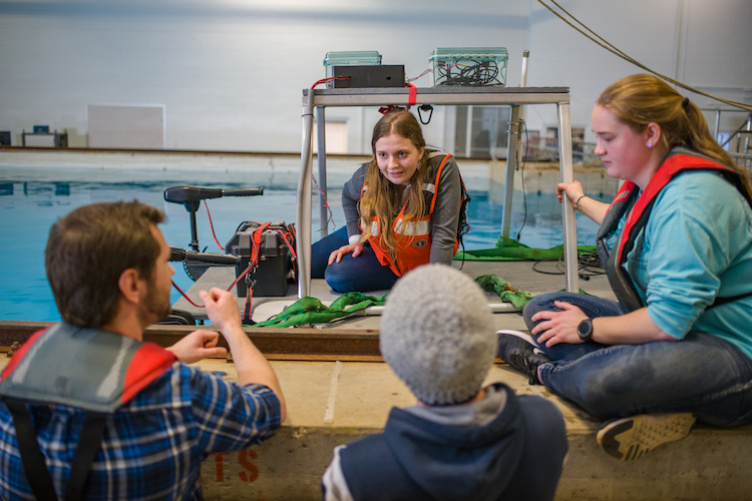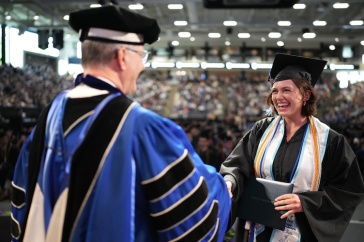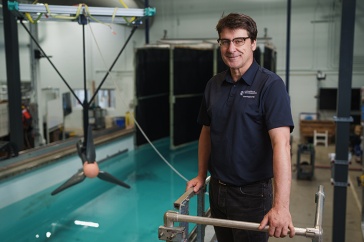
Back in high school, when Audrey Balaska ’19 was thinking about what she wanted to study in college, she came up with a list of three possibilities: music, so she could be a professional cellist (she started playing when she was 10), English because she loved to read and mechanical engineering because she loved math and science just as much.
She didn’t know then that her choice of mechanical engineering would end up being shaped by an experience she’d had when she was a high school sophomore and wound up in the emergency room, unable to move.
It was summer, field hockey preseason and the gripping pain in her ankles and hands was chalked up to workouts. Then it spread to her knees, her hips, a pain so intense that Balaska couldn’t walk. She was homebound for three months. When she finally returned to school, it was in a transport chair, one that had to be pushed by someone else because she couldn’t use her arms.
“I want to build devices that can be life-changing for people with physical disabilities.”
“I remember kids staring at me. It didn’t look like there was anything wrong with me; I didn’t have something that you could see,” says Balaska, who eventually was diagnosed with reflex neurovascular dystrophy, a rare disorder characterized by severe chronic pain. “It was so dehumanizing. I knew right then I would be passionate about helping people for the rest of my life.”
In May, after she receives her bachelor’s degree in mechanical engineering, the Guilford, Connecticut, native will be on her way to doing just that as she continues on for her doctorate. Her plan is to study control engineering and robotics and work in the field of rehabilitation engineering.
“I want to build devices that can be life-changing for people with physical disabilities,” Balaska says. “When I was ill, if I was in the chair by myself, I couldn’t even reach behind me and get a book out of my backpack.” She stops to describe a method she thinks would solve such a problem: a mechanical arm of sorts. “I want to be one of those people that says, 'So if you can’t walk, what can we do to help you have an independent life?’ and then figures it out.”
That kind of thinking has been beneficial in Balaska’s work-study job, where she assists Therese Willkomm, a clinical associate professor of occupational therapy who runs assistive technology workshops to help people with disabilities better use technological devices.
Balaska spent the summer of 2017 at Cleveland State University in their rehabilitation engineering program. The 10-week program was funded through a National Science Foundation Research Experiences for Undergraduates grant.
“I’m the kind of person that reads all the department announcements. I saw this listed and realized I’d found my dream,” Balaska says of applying for the funding. “When I got the call that I’d gotten it, I literally screamed into the phone.”
At Cleveland State she worked with the physical therapy department in their motion analysis lab to create a wireless load cell prototype that could sync with motion-capture cameras. The load cell determines how much people rely on a harness during balance training.
In 2018, Balaska was selected to participate in the inaugural engineering innovation for society design competition at Rensselaer Polytechnic Institute. She was part of a five-member team that worked to create a system one person could use to protect a patient in a wheelchair from the weather during transport. And during this year’s winter break, Balaska spent three weeks at the University of Melbourne on a research project that combined robotics and rehabilitation engineering.
Balaska says she has always been good at problem-solving and so far, her mechanical engineering studies have confirmed that. While she still loves the cello — she named hers Charlie — she is convinced she has chosen the right career path.
“I’ve gotten a lot of validation that this is what I’m good at,” Balaska says. “And that’s been reaffirming. I really wanted to do something where I wouldn’t end up years from now saying, ‘What am I doing here?’ It feels like I can do this for the rest of my life.”
See what you can do with a degree in mechanical engineering.
-
Written By:
Jody Record ’95 | Communications and Public Affairs | jody.record@unh.edu
















































